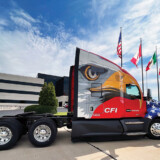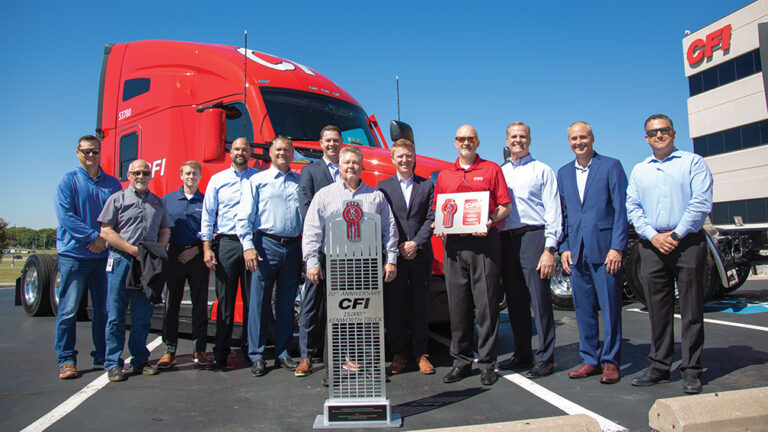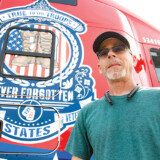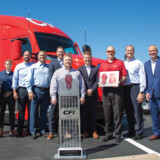


It all started in 1951 with a truck, a pair of trailers, and a dream, the story goes. At least, one of the stories. That’s because, as currently configured, Contract Freighters, Inc., has incorporated the history of numerous carriers, each with a story of its own. Con-way, XPO, Transport America, UPS Freight, and many more are familiar carrier names that are now a part of the Joplin, Missouri-based operation that does business as CFI.
CFI is, itself, a subsidiary of the larger TFI International, a holding company operating more than 80 individual companies in the U.S., Canada, and Mexico. CFI currently has more than 90 terminals in North America and handles more than 260,000 shipments per year.
“I know everybody says this, but our people are what really makes a difference,” explained CFI President Greg Orr. “We just celebrated our 70th anniversary as a company. I think that is probably one of the biggest things that we’re extremely proud of as we continue to invest in our people and our professional drivers. Ultimately, that’s what made this company successful for so many years.”
Like other carriers, CFI was hit hard by the COVID-19 pandemic and weathered changes to its day-to-day operation.
“I think there is a ton of learning that we’ve encountered over the last couple of years,” remarked Orr. “Literally within about two weeks, we had 450 to 500 people that went from working in an office environment to being dispersed in their homes to execute our business, and we never missed a beat.”
While the work of running the business was being accomplished, Orr noticed the downside, too.
“You don’t realize what you have until it’s gone,” he stressed. “Our environment is set up here, especially in Joplin, to be open and available to all of our drivers, and we had to literally shut that off for 18 months.”
While communication could be accomplished through phones, emails and satellite units, the team struggled with losing many of the interpersonal relationships enjoyed prior to COVID.
“You can tell when we talk to our drivers that that culture is missed,” said Orr. “We’re just now slowly kind of opening that back up again to where we have a lot more face-to-face conversations.”
The pandemic caused relationships with some customers to change as well.
“You realize what customers you want to work with and which ones you don’t,” he added. “There were a lot of customers that were very open, willing, and able to do whatever they could to help accommodate the professional drivers. And I’ll say there was a select few that — how do I politely say this? — just didn’t respectfully handle the situation probably as well as they could have.”
With more than 3,000 tractors in the fleet, CFI depends on professional drivers for its truckload, dedicated, and temperature-controlled divisions.
“Ultimately, it’s not just us; it’s everybody in the industry,” explained Orr. “We’ve got to make sure that we don’t lose any drivers, whether it’s CFI or whether it’s the industry.”
CFI can boast of some unique statistics among its driving fleet. Over 560 of its drivers have achieved million-mile status. Women make up around 14% of the driving staff, about twice the national average.
“We’ve had some very strong female representatives that we were very fortunate to have that helped us market, and that drew a lot of attention,” he said. One long-term female driver has since retired, and the company is looking for the next representative.
CFI’s She Drives CFI program helps female drivers feel safe and supported at work. The company has been named a Top Company for Women to Work for by Women In Trucking multiple times.
“We definitely have a desire to find the most professional, safest driver, whether that be male or female,” he said. “We love and respect our female drivers because their performance is very similar to male drivers, and in some cases we see that their accident ratio is improved.”
The company has a robust program for recruiting military drivers, too. About 14% of the driving cadre comes with veteran status. CFI’s True to the Troops program honors veterans with specialized truck and trailer wraps, and an apprenticeship program is available for qualified veterans to use their G.I. Bill benefits to supplement their income for their first year.
CFI has an agreement with the U.S. Army Recruiting Command to provide priority hiring status to qualified soldiers participating in the Partnership for Youth Success (PaYS) program and supports projects that support the military, such as Holy Joe’s Café and Wreaths Across America.
One part of CFI’s business that many carriers don’t deal with is shipments to, from, and within Mexico. Annually, the company handles more than 62,000 truckload shipments to and from the country, with another 27,000 cross-border and intra-Mexico shipments. CFI owns an LTL network and maintains a relationship with more than 190 C-TPAT (Customs-Trade Partnership Against Terrorism) carriers.
Like other carriers, CFI is facing challenges in finding qualified drivers in today’s labor market. Orr explained, “The challenge that I think we all have is the driver shortage, not only in the U.S. but in Mexico. That’s really where I think there’s more of a bottleneck than anything at this point.”
Orr thinks the problem goes beyond the trucking industry. “When you look at society as a whole, I can’t say that we’re all focused on creating truck drivers from our children or our children’s children.”
Availability of new equipment is a challenge as well.
“We’re pretty fortunate,” Orr said. “We had placed a pretty large tractor order at the beginning of the year and another large order about mid-year; plus, with our sister company acquisition of the UPS LTL division. We’re positioned very well with our manufacturers. The trailer side is, I think, even worse than the tractor side.”
Orr feels that rising equipment costs may be a bigger problem than availability.
Whether organically or by acquisition, CFI is poised to continue growing into the future.
Cliff Abbott is an experienced commercial vehicle driver and owner-operator who still holds a CDL in his home state of Alabama. In nearly 40 years in trucking, he’s been an instructor and trainer and has managed safety and recruiting operations for several carriers. Having never lost his love of the road, Cliff has written a book and hundreds of songs and has been writing for The Trucker for more than a decade.
















